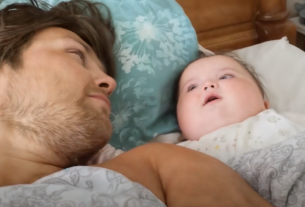Olga stood by the stove, stirring the vegetable soup, when the phone rang. Denis picked up the receiver, and within a second, from the tense way his back straightened, she understood—his mother was on the line.
— Hi, Mom. What happened?
Nadezhda’s voice flowed from the phone, sweet yet venomous:
— Denis, dear, you wouldn’t mind if your sister stays with you for a while, would you? With her children, of course. — And don’t you dare object, I’ve already decided.
The spoon in Olga’s hand froze halfway to her mouth. Her ears rang. There it was. It had begun.
— She’ll stay at our place, Mom, — Denis corrected, casting a quick glance at his wife. — Olga is also the mistress of the house here.
— Of course, darling, — Nadezhda laughed, but there was a steely note in her voice. — I’m just so worried about Annushka. That scoundrel of a husband kicked them out, and she has two little ones — Stepan is six, and Lika is only four. Where are they supposed to go?
Olga slowly set the spoon down on the table. Her palm involuntarily clenched into a fist. They knew about Anna’s problems—Denis’s younger sister. Her marriage had been a mistake from the start. But it was one thing to feel sorry from a distance, and another to invite them into their home, into their quiet sanctuary.
— How long is she planning to stay? — Olga heard her voice trembling and hated herself for this weakness.
— Oh, not long! — Nadezhda paused, as if calculating the time. — A month, maybe two. Until she finds a job and rents an apartment.
Denis glanced at his wife. His eyes silently pleaded «please.» Olga felt the nausea rising. He had already decided. Without her.
— Of course, let her come, — he said into the phone with a firm voice. — We have the space.
When the conversation ended, Olga silently took the plate to the sink. Their spacious three-room apartment, the one they had poured so much effort into, their fortress, suddenly felt fragile, as though someone had already positioned a battering ram against its walls.
— Den, — she turned to her husband, trying to speak calmly, — we could have discussed this first.
— What’s there to discuss? — Denis spread his hands in genuine confusion. — She’s my sister. She has two small kids. Do you want them to sleep on the street?
— No, but…
— Well, then. — He hugged her and pulled her close. Olga smelled his cologne, familiar and so comforting. — It won’t be for long. A month or two, and they’ll move out. We won’t even notice.
Olga remained silent, burying her face in his shoulder. To him, this was just helping family. To her, it was an invasion of their life, their space, where she already felt like an outsider under Nadezhda’s scrutinizing gaze.
Anna arrived three days later. Olga watched from the window as a taxi unloaded two huge, battered suitcases, a bag of toys, and two children—six-year-old Stepan and four-year-old Lika.
— Thank you so much! — Anna rushed to hug her brother, then, after a brief hesitation, Olga. Her perfume hit Olga’s nose—sweet, heavy. — I’m so grateful! I promise, I’ll settle in quickly and leave. A month, max!
— Come in, make yourselves at home, — Olga forced a tight smile.
She led them to the guest room—a spacious 20-square-meter room that she and Denis had intended for a nursery but never followed through on having a child. An empty white bed, light-colored walls, an empty wardrobe… Usually, this made Olga feel a quiet sadness, but now she just thought: Good thing there’s nothing in here.
— Dinner in half an hour, — Olga said as she left. — Come when you’re settled.
The evening passed relatively calmly. The children, exhausted from the journey, quickly fell asleep. Over dinner, Anna talked about her plans:
— I’ll get a job anywhere, even as a cashier. There’s a “Pyatyorochka” around the corner—they’re always looking for people. Then I’ll hire a nanny for the kids and rent an apartment…
Olga nodded, watching as Denis chatted lively with his sister. He hadn’t seen her much in recent years—work, business… Now he was making up for lost time, asking about everything.
— I’m so grateful to you, — Anna repeated the phrase for the third time that evening. — This is all temporary, honestly.
“Temporary” always becomes permanent, — Olga thought darkly, but only said aloud:
— Don’t worry. It will all work out.
The first week passed tolerably. Anna really did look for a job, took the children out to play, and tried not to interfere. But then, things began to change.
One day, when Olga came home from work earlier than usual, she froze at the kitchen door. New curtains hung in the windows—brightly patterned, with crimson roses, jarring to the eye after their strict beige minimalism. Her favorite ceramic mugs, always on the open shelf, were now hidden in the cupboard.
— Oh! You’re home! — Anna cheerfully entered the kitchen, holding Lika in her arms. — Do you like it? I freshened things up a bit.
— These… are new curtains, — Olga struggled to find the words.
— Yes! I bought them today at IKEA. You know, it was so dull here. Mom always said…
Olga gritted her teeth. Of course, Nadezhda never missed an opportunity to criticize her taste, even in the smallest things.
— Anna, — she took a deep breath, — next time, please ask me before changing anything.
— Oh, come on! — Anna laughed as though it were a joke. — It’s just curtains!
That evening, Olga tried to talk to Denis.
— We need to set some boundaries, — she began.
— What boundaries? — Denis put down his book, frowning. — Anna’s not in the way. The kids make noise sometimes, but what can you do? They’re little.
— It’s not about the noise! — Olga propped herself up on her elbow. — She’s rearranging things, changing the curtains, even put my mugs away!
— Mugs? Curtains? — Denis laughed. — Seriously, Olga? You’re upset about this?
— It’s important to me! — her voice quivered. — This is my home, and I want everything in it to be the way I like it.
— Our home, — he corrected her, and for the first time, there was irritation in his voice. — And right now, my sister and her kids are living here. We need to be understanding.
— I’m the only one being understanding here, — Olga whispered, turning away.
— Don’t dramatize it.
The conversation hit a dead end.
Two weeks later, Anna announced joyful news over dinner:
— I got a job! At “Pyatyorochka,” three days a week as a cashier.
— That’s great! — Denis beamed, as if his sister had just been promoted to director.
— They pay peanuts, of course, — Anna grimaced. — But it’ll do for now. But… — she made a guilty face, — I’ll have to leave the kids with you sometimes.
— Of course! — Denis immediately agreed, without even looking at his wife.
Olga nearly choked on her bread. She worked from home those same three days—her most productive ones when she could get the most done.
— I… I work those days, — she said cautiously. — I don’t think I can watch the kids while working.
— Oh, don’t worry! — Anna waved her hand, as if swatting away a pesky fly. — They’ll entertain themselves. Just put on cartoons, and no problem.
That evening, when the guests went to bed, Olga had her first real argument with Denis in a long time.
— Are you even listening to me? — she tried to speak quietly, but her voice betrayed her with a tremble. — I can’t work and babysit at the same time!
— Can’t or don’t want to? — Denis spoke to her in a tone she had never heard before. — My sister is trying to get back on her feet, and you only think about yourself!
— And you only think about your sister, forgetting about your wife!
— Olga, — he ran his hand over his face, — what’s happening to you? You weren’t like this… so selfish.
Selfish. Olga felt hot tears streaming down her face.
— Do you really think that? — she whispered.
Denis didn’t answer, turned, and went to the bathroom, slamming the door behind him.
The situation worsened day by day. Anna started staying out longer—either at work or with friends. The children stayed with Olga, who was struggling to balance work and taking care of them.
One such day, two unpleasant incidents occurred.
First, during an important videoconference with a key client. Olga had just begun her presentation when Stepan and Lika burst into the room, screaming:
— Aunt Olga! He took my doll!
— That’s my toy car! Give it back!
The client on the screen raised an eyebrow. Olga, blushing, apologized and left, taking the kids to another room. When she returned, the client was clearly displeased. The contract she had been working on for months was now in jeopardy.
Later that evening, when she finally had a moment to relax, the sound of breaking glass reached her ears. Olga rushed into the living room to find the shattered pieces of the wedding vase— a gift from her parents. Stepan stood next to it, holding a toy car in his hands.
— I… I didn’t mean to…
— It’s okay! — Anna rushed into the room, grabbing her son’s hand. — We’ll buy a new one, an even better one!
— That vase was important to me, — Olga quietly said as she picked up the shards.
— Oh, please, a vase! — Anna scoffed. — The main thing is, Stepan is fine.
At that moment, Olga realized—her patience had run out.
The next day, Katya—Olga’s younger sister—arrived. Energetic, straightforward, she immediately understood the situation.
— What’s going on here? — she asked when they were alone in the kitchen. — Why have you become a free nanny and maid?
— You’re exaggerating, — Olga replied tiredly.
— No, you’re underestimating the situation. Your mother-in-law and sister-in-law have settled on your neck, and you’re silent.
— What can I do? Denis doesn’t see the problem.
— Talk to him. Seriously.
Olga knew Katya was right. But every time she tried to bring it up, Denis either brushed her off or accused her of being cold-hearted.
The turning point came unexpectedly. Olga returned from the store earlier than usual and overheard Anna’s voice from the kitchen:
— Yes, Mom, everything’s going according to plan. Of course, I’m not leaving. Why? This apartment has plenty of space for everyone. Olga? Well, she complains, but Denis always supports me.
Olga froze in the hallway, gripping the bags. What she had suspected was true—Anna wasn’t going anywhere.
At dinner that evening, Anna announced:
— I’m quitting.
— What? Why? — Denis put his fork down. — You just started.
— The schedule is inconvenient. I want to spend more time with the kids.
Olga felt her hands go cold. If Anna was quitting, what was the point of renting an apartment?
— How are you going to rent a place without a job? — she asked directly.
— Oh, I’m not rushing into that yet, — Anna waved it off carelessly. — We’re so comfortable here! Right, kids? — She patted Stepan on the head. — Uncle Denis and Aunt Olga love you, right?
— Yes! — the kids shouted joyfully.
— Anna, — Olga tried to speak calmly, but her voice trembled with emotion, — when you came, we agreed on a month. It’s already been more. You promised to look for an apartment.
— What’s the rush? — Denis intervened. — Let them stay as long as they need to.
— And did you ask me? — Olga stood up, knocking over her chair. — This is my home too!
— Olga, we’ve already discussed this!
— No, Denis! — her voice cracked into a shout. — You made the decision without consulting me, and I agreed. But this can’t go on any longer!
She turned to Anna:
— You need to find somewhere else to live.
A silence fell. Even the children sensed the tension.
— You… you’re kicking us out? — Anna’s eyes widened, tears welling up.
— I’m asking for the original agreement to be respected.
— Olga, you don’t have the right to do this! — Denis jumped up, slamming his fist on the table. — This is my family!
— And who am I? — Olga felt tears running down her face but couldn’t stop them. — Am I not family to you, Denis? Or not anymore?
His face twisted with anger, but suddenly something in him softened. He lowered his eyes.
— You know what… — Olga took a deep breath. — I’m going to Katya’s. I need some time alone.
— Olga, don’t…
— No. When you figure out who’s more important to you—your sister or your wife—then you can call me.
She turned and left, slamming the door behind her. For the first time in five years of marriage, she had made an ultimatum. And she was scared.
Katya greeted her without words, simply hugging her and leading her to the guest room.
— It was about time you did this, — she said, bringing tea.
— What if I overstepped? — Olga squeezed the cup with trembling hands. — Maybe I am really selfish?
— You? — Katya snorted. — Sis, you’re the most patient person I know. Standing up for your boundaries doesn’t make you selfish.
Two days passed, and Denis didn’t call. On the third day, the doorbell rang.
— Can I come in? — he stood on the threshold, unsure whether to cross it.
Katya let him in but soon returned with a tray:
— You need a mediator.
And she said everything she thought: how Anna and Nadezhda manipulated Denis, how he ignored his wife’s feelings, and how important it was to respect personal space.
— You want to help your sister—that’s commendable. But not at Olga’s expense.
Denis listened silently. It was clear that every word was hitting its mark.
— I… I didn’t think about it, — he finally admitted. — Olga, I’m sorry. I was blind.
At that moment, his phone rang. Anna. Even from a distance, her panicked voice was audible:
— The pipe burst! There’s water everywhere!
— Okay, I’m coming.
He looked at Olga with a guilty expression.
— I need to…
— Go ahead, — she nodded. — But this doesn’t change our conversation.
When Denis arrived home, the scene was grim: water had flooded half the guest room, the carpet was soaked through, and the wallpaper was peeling off in strips.
— Finally! — Anna was pacing around the apartment, doing nothing. — I didn’t know what to do!
— Did you call an emergency plumber? — Denis asked, turning off the water.
— No, I was waiting for you!
And then he realized: his thirty-year-old sister had done nothing—didn’t call a plumber, didn’t clean up the water, didn’t even turn off the tap. She had been waiting for her brother to come and fix everything.
How was she planning to live independently with two children?
That evening, Denis had a decisive conversation with Anna:
— You need to move out. I’ll help with the rent, but you’ll be living separately.
— What, you’re kicking me out? — Anna burst into tears, talking about “family values,” about Mom. But Denis stood his ground.
Three days later, Olga came home. The atmosphere was tense, but Denis had kept his word—he had found Anna a small apartment nearby and paid for the first month.
— I’m not abandoning you, — he told his sister. — But you need to learn to be independent.
Two weeks later, Anna and the kids moved out.
The relationship between Olga and Denis gradually improved. They talked a lot—about what had happened, about their feelings, about the future.
— I was blind, — Denis admitted one evening, hugging her on the couch. — Mom and Anna always pressured me with “family ties,” and I forgot that my main family is you.
— And I was afraid to say anything, — Olga confessed.
They decided to redecorate the guest room—Denis wanted to turn it into a workshop for his hobby, and Olga dreamed of a small library.
— Maybe, someday, it will become a nursery again, — Olga said quietly. — Maybe… we’ll think about adoption?
Denis hugged her tighter.
— I really want that. But only when we’re both ready.
A month later, Nadezhda called. For the first time in all these years, her voice sounded uncertain:
— Olga, I… I wanted to apologize. I shouldn’t have interfered in your life.
— Thank you, Nadezhda Ivanovna, — Olga was genuinely surprised.
— Anna has found a good job. It seems she really needed this… push.
After the call, Olga sat quietly, reflecting. Perhaps her relationship with her mother-in-law would improve. But now—on different terms.
That evening, she told Denis about the conversation.
— You know, — he said thoughtfully, — I’ve realized one important thing. True care isn’t about indulging weaknesses, it’s about helping someone stand on their own feet.
Olga nodded. This crisis had taught them a lot. But most of all, she was just glad to feel at home again—in her own home, with a husband who had finally heard her.



